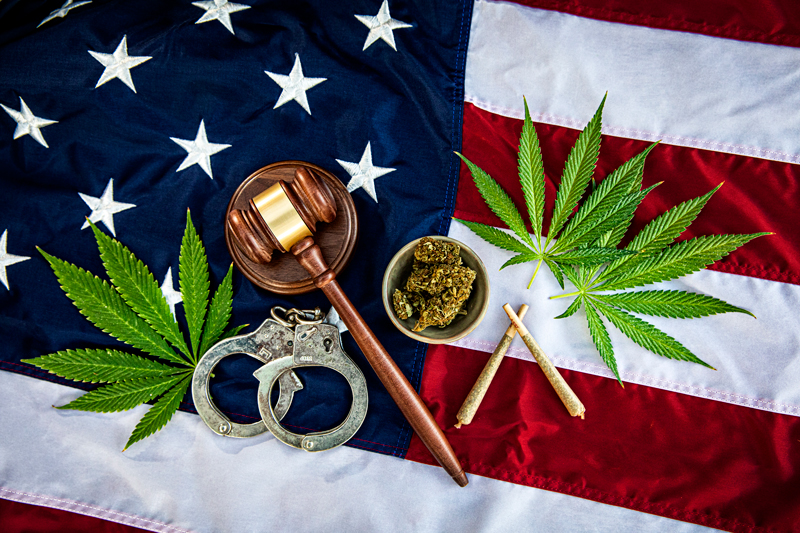Laws around cannabis can be confusing. Individual states have their own laws and regulations surrounding the plant and its products. Now, legislation called the MORE Act is being introduced that would legalize cannabis on a federal level.
Current Federal Status
Cannabis is legal for adult-use in 19 states and for medical use in 36 states. However, under federal law, cannabis is still considered a Schedule I substance under the Controlled Substances Act of 1970. Schedule I drugs are classified as drugs without any medicinal value that have a high risk for abuse.
Other schedule I substances include heroin, LSD, mescaline, psilocybin, and MDMA.
However, CBD, a non-psychoactive compound found in hemp (cannabis plants containing little to no THC) is federally legal. The Farm Bill, passed in 2018, allows the cultivation and commercial sale of hemp and CBD products including flower, oil, concentrates, and edibles.
Psychoactive products synthetically derived from CBD such as delta-8 THC and THC-O have also emerged in the U.S. market, but the legality of these products is less clear than that of CBD.
They do not contain delta-9 THC, the compound explicitly banned according to federal law, but they could still be considered illegal under the Federal Analogue Act, a section of the United States Controlled Substances Act passed in 1986 that bans designer chemicals structurally similar to drugs already banned under U.S. law.
For now, delta-8 and THC-O are available on shelves of dispensaries and smoke/vape shops across the country, but if the White House decides to pursue legal action against manufacturers, these substances could potentially disappear from the market.
Current State Status
If the subtleties between hemp, cannabis, and analogues seem complicated, the technicalities of state versus federal law are nearly impossible to dissect.
Essentially, the Supremacy Clause of the United States Constitution (Article VI, Clause 2) establishes that federal law controls when state law and federal law conflict, according to criminaldefenselawyer.com.
The Constitution provides an exemption to this clause when it comes to the exercise of police powers, which are delegated to the states.
States cannot prevent federal cannabis prosecutions, but the federal government typically does not interfere with citizens, manufacturers, or retailers who are operating within the laws of their state. This precedent was established in 2013, when the Department of Justice (DOJ), under President Obama’s administration, formally announced that it would not interfere with marijuana operations that strictly complied with state regulations.
The DEA does intercede in illegal cannabis operations when the distribution network funds gang activity, incites violence, or includes the sale of other illicit substances.
Current Legislation
Legislation that would simplify current cannabis laws by making the plant and its derived products legal on a federal level is making its way through Congress.
The Marijuana Opportunity Reinvestment and Expungement (MORE) Act would lift cannabis prohibition nationwide and provide expungement of certain cannabis offenses. Legalization on a state level would still be left to residents, however.
The bill would “end decades of failed and unjust marijuana policy,” Democratic Representative Ed Perlmutter said on the House floor on Thursday ahead of the vote. “It is clear prohibition is over. Today we have an opportunity to chart a new path forward on federal cannabis policy that actually makes sense.”
This was the bill’s second sojourn in the House, passing with 220 votes in favor and 204 opposed. The vote split almost evenly along party lines with most Democrats supporting the bill and the majority of Republicans contending it. Heading to the Senate next, the MORE Act will face stark opposition from minority leader Mitch McConnell and many of his Republican colleagues.
The MORE Act will need to gain 60 votes in an evenly divided Senate, a prospect that is considered unlikely due to a lack of support from Republicans.
The legal industry generated $25 billion in sales last year, a 43% increase over 2020, and is expected to hit $65 billion in 2030. Moral and medical arguments aside, the bill may pass purely on the positive economic impact of the industry.
Senate Majority Leader Chuck Schumer and Senators Cory Booker and Ron Wyden are also planning to introduce their much-anticipated federal decriminalization bill, the Cannabis Administration and Opportunity Act later this month, which could hinder the progress of the MORE Act in the Senate.
Troy Carter, a Democrat from Louisiana, said 91% of Americans want some form of cannabis to be legal and there are more important priorities the police should be focused on. The questions are, which bill has more power to pass the gauntlet of Congress, and which legislation will be most beneficial to the American people?








